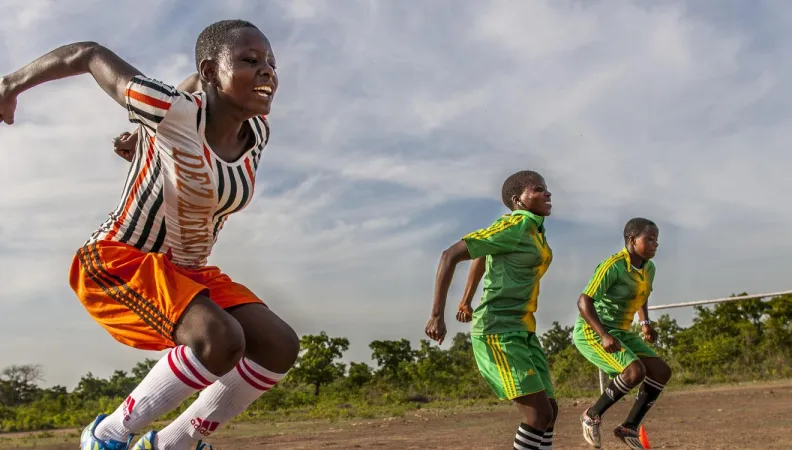Share the page
A Program for Champions: Soccer tackles gender inequality in West Africa
Published on

Agence Française de Développement and FIFA are sponsoring the "Championness program" implemented by the NGO Plan International in Benin, Guinea, and Togo. It aims to reduce gender inequalities through the development of women's soccer, starting in the protective environment of schools.
In West Africa, 30% of girls aged 15-19 are married, divorced, or widowed. Child marriage, sexual violence, genital mutilation and pregnancy are part of their daily lives and, along with unequal access to land and financial services, represent considerable obstacles to their economic and social empowerment. Much remains to be done to achieve gender equality.
It is in this context that the "Championnes" (champion girls and women) program was born. Implemented by the NGO Plan international France, which works to advance children's rights and equality between girls and boys, and financed by FIFA, Plan International France, and AFD, with a budget of approximately 4 million euros, it aims to change attitudes by developing women's soccer in three countries: Benin, Togo, and Guinea.
Modernized infrastructure with community support
Why sports, and why soccer in particular? The objective is to strengthen young women's self-esteem and their ability to be agents of change within their communities, through a sport that is very popular in West Africa but not always easy to play for a female audience.
AFD has made sports a central focus of its operations as part of a Sports and Development strategy adopted in February 2019. This strategy promotes sports for everyone by encouraging access to sports and defending gender equality. Women's sports can be used as a tool for empowering and validating girls and women around the world. It is also a universal, inspiring, and unifying language, while offering the possibility of transcending borders and cultures.
The 5,390 young participants in the project, between the ages of 12 and 24, will have the opportunity of playing soccer at modernized facilities that enable both male and female players to coexist. "The Championnes project will create sports associations for young girls in secondary schools that will also enable boys, teachers, and parents to get involved," says Léa Cezeur, who oversees the project at AFD's Gulf of Guinea regional office. Participatory land reclamations are being conducted in all three countries to get the local communities involved.
Overcoming taboos and empowering girls through awareness
Awareness-raising activities are also planned in conjunction with the practices during the three-year project, from October 2020 to the end of 2023. They will enable girls to acquire knowledge and skills related to decision-making, such as consent, contraception, and menstrual management, and understand their rights, thus preventing gender-based violence.
Parents and families, leaders of sports associations, local NGO leaders, implementing partners and prefectural and municipal authorities will also be educated about negative norms and beliefs that affect girls' development, gender stereotypes, and equal opportunities. All of them will thus see their capacities strengthened to promote the empowerment of young girls.
At the same time, support is also provided for developing village savings and credit associations in the form of training and technical assistance. These will enable young girls and boys to participate in local self-help systems so that they can benefit from economic support and support the community if they so desire. "In Togo, I was able to see the enthusiasm,”said Léa Cezeur. “It was not difficult to create women's teams, and it was very motivating to meet parents and village chiefs who were aware of the plight of young girls and motivated to make a difference." Some 1,800 girls and 480 boys participating in the Championnes program were selected in June as being eligible for support.
In Guinea, 1,680 girls and 840 boys from 131 schools and learning centers participated. About 161 coaches were selected from the schools, 45% of whom were women. As for Benin, 60 sports associations have been set up, consisting of 1,440 girls and 360 boys.
A sign of progress on the pitch, which it is hoped will manifest in other sports and beyond.
